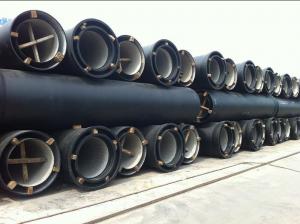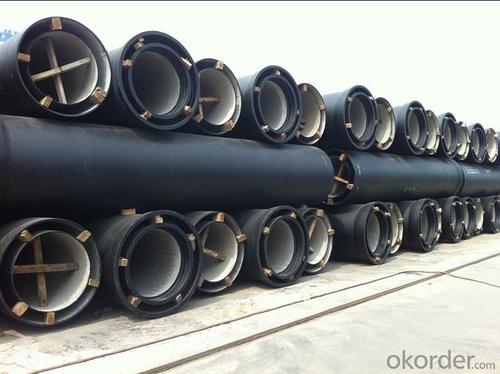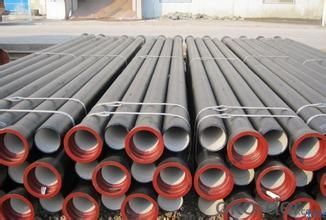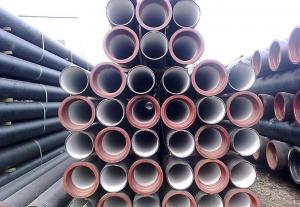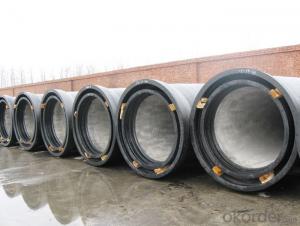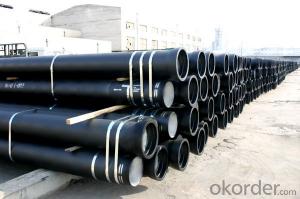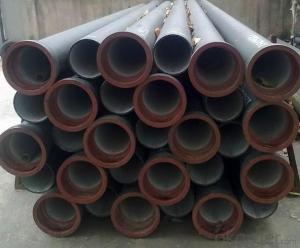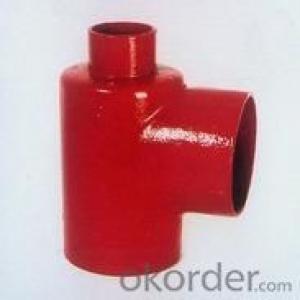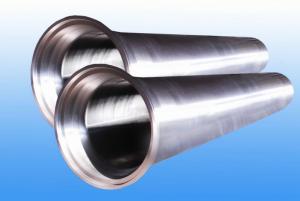Ductile Iron Pipe of China Class EPDM ISO2531
- Loading Port:
- China main port
- Payment Terms:
- TT or LC
- Min Order Qty:
- 1000 m
- Supply Capability:
- 50000 m/month
OKorder Service Pledge
OKorder Financial Service
You Might Also Like
1. Ductile Iron Pipe Description :
It has high strength & hardnes as steel and better corrosin resistance than steerl and grey iron, I ductile iron pipe is the ideal substute for gray cast iron pipe and common steel pipe. In addition, our DI pipes are produced with good straightness, identical wall thickness, high dimension accuracy, smooth surface finished, remarkable mechanical properties and firmly sticking internal & external coating layer as well. Flexible Push-in joint and rubber gasket are used for more convenient installation of pipelines.
2. Ductile Iron Pipe Main Features:
- For potable water supply
- High strength
- Long lifespan
- Good corrosion resistance
- Easy installation
3.Ductile Iron Pipe Images:
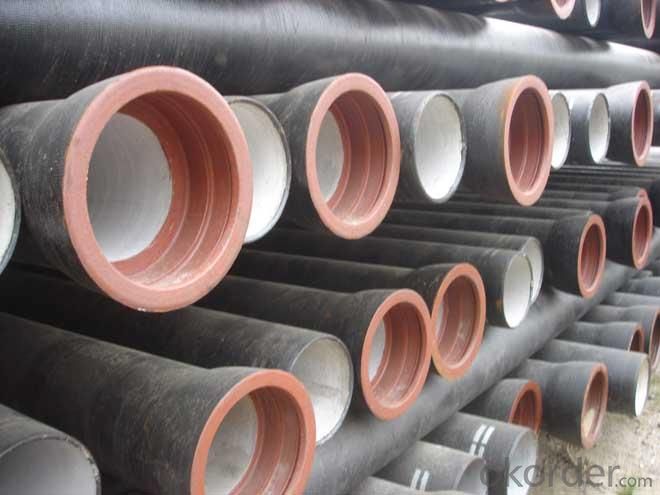
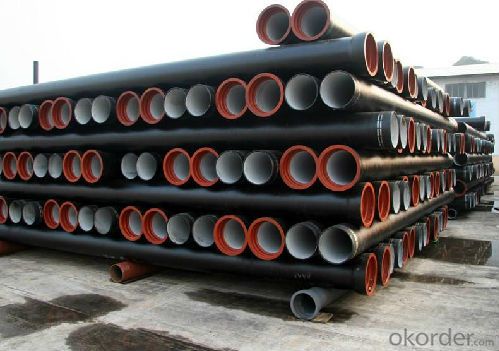
4.Ductile Iron Pipe Specification:
1) The standard of pipe: ISO2531:1998, K9
2) Effective length: 6m
3) Inner cement line: Portland cement line as per ISO4179
4) Zinc coating: at least 130g/m2 as per ISO8179
5) Bitumen painting: at least 70um as per ISO8179
6) With 100% quantity of NBR ring, or SBR ring, or EPDM ring as per ISO4633
7) High strength, lighter than grey iron, good corrosion resistance, no furring, small flow resistance, easy fixing, long life tome about 100 yeas
5.FAQ:
· Management Systems-Internal Software
· Finished Product Inventory-More Than 5000 Tons.
· Raw Material inventory -Over 8000 Mertic Tons.
· The most convenient transport and prompt delivery.
· Competitive price with best service .
· High technical production line with top quality products.
- Q: Are ductile iron pipes suitable for power plant applications?
- Ductile iron pipes are a suitable choice for power plant applications. Unlike traditional cast iron pipes, ductile iron pipes have improved strength, durability, and flexibility. These properties make them ideal for power plants, where they face high pressure, extreme temperatures, and corrosive environments. Power plants require a reliable and strong piping system to transport various fluids, including water, steam, and chemicals. Ductile iron pipes have a high tensile strength and can withstand high pressure, ensuring the safe and efficient flow of fluids within a power plant. They are particularly suitable for power generation applications that involve high-pressure steam. Moreover, ductile iron pipes have excellent corrosion resistance, which is crucial in power plants where many fluids are highly corrosive. The internal and external linings of these pipes protect them from corrosion, ensuring a longer service life and reducing maintenance costs. This corrosion resistance also makes them suitable for transporting chemicals and wastewater within a power plant. In addition, ductile iron pipes can withstand extreme temperatures. Power plants often operate at high temperatures, and ductile iron pipes can handle these conditions without compromising their structural integrity. They have a high melting point and can resist thermal expansion and contraction, making them a suitable choice for applications involving hot fluids and steam. Furthermore, ductile iron pipes are cost-effective compared to other commonly used materials in power plants, such as stainless steel or carbon steel. They offer a balance between performance and cost, making them an attractive choice for power plant applications. In conclusion, ductile iron pipes have the necessary characteristics to meet the demands of power plant applications. Their strength, durability, flexibility, corrosion resistance, and ability to withstand high pressures and extreme temperatures make them well-suited for such environments. Additionally, their cost-effectiveness makes them a practical choice for power plant piping systems.
- Q: How do ductile iron pipes handle water velocity?
- Ductile iron pipes are well-suited to handle water velocity due to their unique mechanical properties. Ductile iron is a highly durable and strong material that can withstand high water velocities without experiencing significant damage or deformation. The pipe's inherent ductility allows it to absorb the energy created by the flowing water, which helps to minimize the risk of pipe failure or bursting. This property makes ductile iron pipes capable of handling high-pressure water flow, making them ideal for applications where water velocity is a concern. Additionally, ductile iron pipes have a smooth internal surface, which promotes efficient water flow and minimizes friction losses. This smoothness reduces the resistance encountered by the water as it flows through the pipe, allowing for higher water velocities without compromising the pipe's integrity. Furthermore, ductile iron pipes can be manufactured in various sizes and thicknesses, allowing for customization based on specific water velocity requirements. This flexibility ensures that ductile iron pipes can effectively handle a wide range of water velocities, from low-flow applications to high-velocity scenarios. In summary, ductile iron pipes have excellent handling capabilities when it comes to water velocity. Their strength, ductility, and smooth internal surface contribute to their ability to withstand high water velocities without compromising their structural integrity, making them a reliable choice for water distribution systems.
- Q: How are ductile iron pipes repaired in case of damage?
- Due to their high durability and strength, ductile iron pipes are commonly utilized in various applications. However, like any other materials, these pipes can sustain damage over time due to external influences or internal corrosion. In such instances, there exist several techniques available for repairing ductile iron pipes. One prevalent method is the trenchless repair technique, which allows for the restoration of the damaged section without the need for extensive excavation. This method typically employs specialized equipment to access and repair the affected area. Its advantages lie in minimizing disruption to the surrounding environment and reducing excavation costs. Another approach for repairing ductile iron pipes involves the application of epoxy lining. This process entails the use of epoxy resin to seal any cracks or leaks on the interior surface of the pipe. Epoxy lining is a cost-efficient and effective solution as it provides long-lasting repairs and enhances the overall condition of the pipe. In cases where the damage is severe or extensive, it may be necessary to replace the damaged section of the ductile iron pipe. This typically involves removing the compromised portion and installing a new pipe section. The replacement process may require excavation and can be more time-consuming and costly compared to other repair methods. Nonetheless, it guarantees a comprehensive and permanent solution for the damaged pipe. It is essential to note that the choice of repair method for ductile iron pipes depends on factors such as the extent of the damage and accessibility. Professional assessment and inspection play a crucial role in determining the most suitable repair technique. Consulting experienced pipeline repair specialists or civil engineers is highly recommended to ensure the most effective and durable repair solution for ductile iron pipes.
- Q: What are the different joint types available for ductile iron pipe?
- There are several different joint types available for ductile iron pipe, each with its own advantages and applications. The most common joint types used in ductile iron pipe installations are: 1. Push-on Joint: This joint type is the most widely used and involves a rubber gasket that is placed into a groove on the spigot end of the pipe. The pipe is then pushed into the bell end of the adjoining pipe, creating a watertight seal. Push-on joints are quick and easy to install, making them ideal for applications that require a fast and efficient installation process. 2. Mechanical Joint: This joint type involves the use of a gland and follower gasket that is compressed between the spigot end of one pipe and the bell end of the adjoining pipe. A series of bolts and nuts are used to secure the joint, ensuring a tight and secure connection. Mechanical joints provide a high level of joint integrity and are often used in applications where higher pressures or heavy loads are expected. 3. Flanged Joint: Flanged joints involve the use of flanges on the ends of the pipes, which are then bolted together using gaskets to create a leak-proof connection. Flanged joints are commonly used in applications where the pipe needs to be easily disconnected and reconnected, such as in pump stations or at valve connections. 4. Restrained Joint: Restrained joints are designed to prevent the pipes from separating under high internal pressures or external forces. These joints typically include a mechanical joint with additional restraining devices such as harnesses, rods, or thrust blocks. Restrained joints are commonly used in applications where there is a risk of pipe movement or where stability is critical. It's important to note that the selection of joint type depends on various factors such as the application, operating conditions, and project requirements. Consulting with a professional engineer or pipe manufacturer is recommended to determine the most suitable joint type for a specific ductile iron pipe installation.
- Q: Can ductile iron pipe be used for nuclear power plants?
- Yes, ductile iron pipe can be used for certain applications in nuclear power plants. Ductile iron pipe is known for its strength, durability, and corrosion resistance, making it suitable for various industrial and infrastructure projects. However, when it comes to nuclear power plants, specific factors need to be considered. One of the primary concerns in a nuclear power plant is the safety and reliability of the materials used. While ductile iron pipe meets many requirements, it may not be the ideal choice for critical applications such as transporting radioactive fluids or handling high-pressure or high-temperature systems within the plant. These applications often require materials with exceptional resistance to corrosion, stress, and radiation damage. In nuclear power plants, other materials like stainless steel, nickel alloys, or even specialized materials like Inconel are commonly used due to their superior properties. These materials offer better resistance to radiation-induced embrittlement, corrosion, and high-temperature and high-pressure conditions. Therefore, while ductile iron pipe may have its uses in non-critical applications within nuclear power plants, it is important to consult industry experts, engineers, and comply with relevant nuclear safety regulations to determine the most appropriate materials for specific applications within the plant.
- Q: Are there any alternatives to ductile iron pipe for water distribution?
- There are various options available for water distribution besides ductile iron pipe. Some commonly used alternatives include: 1. PVC (Polyvinyl Chloride) Pipe: PVC pipe is frequently chosen for water distribution due to its affordability, durability, and resistance to corrosion. It is lightweight, easy to install, and requires minimal maintenance. 2. HDPE (High-Density Polyethylene) Pipe: HDPE pipe is a flexible and durable choice for water distribution. It is resistant to corrosion, chemicals, and UV rays, making it suitable for both aboveground and underground installations. HDPE pipe is also known for its leak-free joints and long lifespan. 3. PEX (Cross-linked Polyethylene) Pipe: PEX pipe, a flexible plastic pipe, is commonly utilized for water distribution in residential and commercial settings. It is recognized for its ability to withstand freezing, scaling, and corrosion. PEX pipe is easy to install, has fewer joints, and is highly durable. 4. Copper Pipe: Copper pipe has a long history of use in water distribution due to its exceptional resistance to corrosion and extended lifespan. Although it is more expensive than other alternatives, copper pipe is renowned for its reliability and ability to handle high pressure. 5. Steel Pipe: Steel pipe is a robust and durable option for water distribution, particularly in high-pressure scenarios. It can endure extreme temperatures and resist external loads. However, steel pipe is more costly and requires specialized installation techniques. When selecting an alternative to ductile iron pipe for water distribution, it is crucial to consider factors such as cost, durability, corrosion resistance, installation requirements, and specific project needs.
- Q: Can ductile iron pipes be used for road and highway drainage?
- Yes, ductile iron pipes can be used for road and highway drainage. Ductile iron pipes have excellent strength and durability, making them suitable for handling the heavy loads and traffic associated with road and highway drainage systems. Additionally, they have high resistance to corrosion and provide a smooth internal surface, minimizing the chances of blockages and ensuring efficient water flow.
- Q: What are the different sizes available for ductile iron pipe?
- Ductile iron pipes are available in a wide range of sizes to cater to various applications in the water and wastewater industry. The sizes of ductile iron pipes typically range from 3 inches to 64 inches in diameter. The most commonly used sizes include 4 inches, 6 inches, 8 inches, 10 inches, 12 inches, 16 inches, 20 inches, 24 inches, 30 inches, and 36 inches. However, ductile iron pipes can also be manufactured in larger sizes depending on specific project requirements. These different sizes allow for flexibility in designing and constructing water distribution systems, sewage networks, and other infrastructure projects. The selection of the appropriate size depends on factors such as the volume of flow, pressure requirements, and the distance the pipe needs to cover. It is worth mentioning that the size of a ductile iron pipe refers to its internal diameter, also known as the nominal bore. The actual outside diameter of the pipe may vary slightly depending on the manufacturer and the specific dimensions provided. When choosing a size for ductile iron pipes, it is essential to consider factors such as hydraulic capacity, installation requirements, and the compatibility with other pipeline components. Consulting with engineers and industry experts is advisable to ensure the correct size selection for each specific application.
- Q: How do ductile iron pipes perform in high-traffic areas?
- Ductile iron pipes perform well in high-traffic areas due to their durability and strength. They have the ability to withstand heavy loads and traffic loads without experiencing deformation or damage. Additionally, their corrosion resistance properties make them suitable for prolonged exposure to moisture and harsh environmental conditions. Overall, ductile iron pipes are a reliable choice for high-traffic areas.
- Q: How are ductile iron pipes protected against external impact or loading?
- Ductile iron pipes undergo various methods and measures to safeguard them against external impact or loading, guaranteeing their durability and integrity. Several common approaches are employed to protect ductile iron pipes, including: 1. Adequate Thickness and Strength: Ductile iron pipes are designed with ample wall thickness and high strength to withstand external loads and impacts. This design feature ensures that the pipes can endure heavy loads without deforming or cracking. 2. Implementation of Coatings: Ductile iron pipes are typically coated with protective layers to create an additional barrier against external impact. These coatings may comprise cement mortar lining, polyethylene encasement, or epoxy coatings. They not only grant impact resistance but also safeguard against corrosion. 3. Utilization of Proper Bedding and Backfilling Techniques: Proper techniques for bedding and backfilling are crucial in protecting ductile iron pipes from external loads. The correct placement of pipes within suitable materials, such as compacted granular bedding and backfill, helps distribute external loads evenly and minimizes the risk of pipe damage. 4. Consideration of Trench Design: The design of the trench in which ductile iron pipes are installed plays a vital role in safeguarding them against external impact. The dimensions of the trench, slope stability, and proper compaction of the backfill are all taken into account to reduce the likelihood of damage caused by external loads. 5. Implementation of Effective Pipe Layout and Support: Appropriate pipe layout and support are essential for protecting ductile iron pipes from external impact. Sufficient support mechanisms, including thrust blocks, pipe anchors, and pipe restraints, are utilized to absorb and distribute external loads, preventing any damage to the pipes. 6. Installation of Protective Structures: In areas where the risk of external impact is higher, additional protective structures are installed to safeguard ductile iron pipes. These structures may include concrete encasements, bollards, or reinforced concrete slabs, which act as physical barriers against potential impacts. In conclusion, a combination of factors, including pipe strength, coatings, proper installation techniques, and support measures, work together to ensure the protection of ductile iron pipes against external impact or loading. These measures enhance the longevity and reliability of the pipes, guaranteeing efficient performance in various applications.
Send your message to us
Ductile Iron Pipe of China Class EPDM ISO2531
- Loading Port:
- China main port
- Payment Terms:
- TT or LC
- Min Order Qty:
- 1000 m
- Supply Capability:
- 50000 m/month
OKorder Service Pledge
OKorder Financial Service
Similar products
Hot products
Hot Searches
Related keywords
